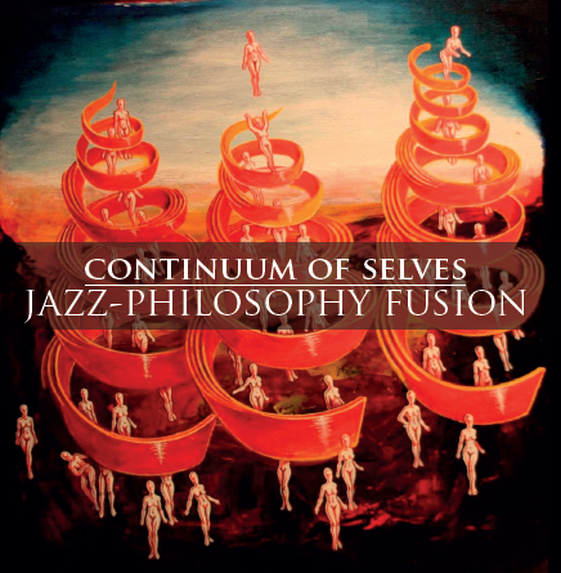Jazz-Philosophy Fusion (2016)
|
1. Teletransportation
The idea of teleporting (like in Star Trek) is that your body is physically replicated in another place. Since the teleporter destroys your original body after replicating it, this raises the philosophical question of whether: (1) teleporting is a way of travelling, (2) the teleporter kills you when it destroys your body and is simply creating a replica of you in another place, a replica which isn’t you. In discussing this issue with philosophy students for around 20 years, I have found that they tend to respond strongly in one way or the other. On the whole, I have found that option (1) is the most popular, but some years almost all my students are certain of (2) – there is always some kind of split, with each side finding the other view practically incomprehensible, stupid even. I have found a similar split among professional philosophers. My own initial reaction as a student was in favour of (2), and although I have never wavered, I have come to a much better understanding of the other reaction, I think. I discuss these issues in chapter 7 of my book, Gods and Titans (2020).
In this song, we imagine a woman going to a teleportation travel agency so that she can reunite with her boyfriend – and then having second thoughts. A very interesting thing to note about this issue is that if technologists were ever able to make a teleporter, then your metaphysical opinion would be quite literally a matter of life or death. If you opted for (1), and were wrong, then you would die. If you opted for (2), and were wrong, you would waste of lot of time and might rightly be considered ridiculous. The emotion in the song reflects this.
In this song, we imagine a woman going to a teleportation travel agency so that she can reunite with her boyfriend – and then having second thoughts. A very interesting thing to note about this issue is that if technologists were ever able to make a teleporter, then your metaphysical opinion would be quite literally a matter of life or death. If you opted for (1), and were wrong, then you would die. If you opted for (2), and were wrong, you would waste of lot of time and might rightly be considered ridiculous. The emotion in the song reflects this.
2. Animalism
In a sense we are animals, no question about that – we are great apes, like chimpanzees and orangutans. There are, however, many ways in which we are radically unlike all the other animals we know about – we are The Explicit Animal, as Raymond Tallis puts it in the title of one of his books (1991). Trying to think of us exclusively in terms of our animalistic natures can lead to some very pessimistic conclusions, such as John Gray’s view that we are not Homo sapiens (wise man) but rather Homo rapiens, the most destructive species on earth, which has evolved in such a way that it cannot help raping the environment for its own benefit, even though, almost inevitably, this will lead to its own extinction. To view us in this way, as a kind of out-of-control bacterium, requires some highly dubious assumptions, as explained in Tallis’s Aping Mankind (2011), and it also very unhelpful – but it is an influential vision nonetheless. These are the issues explored in this song.
3. Dream, Death, and the Self
This song is based on American philosopher J.J. Valberg’s book of the same title (2007). Valberg explains that there are two ways of thinking about our conscious experiences, the phenomenal and horizonal conceptions, and that widespread neglect of the latter has generated much philosophical misunderstanding. The phenomenal conception is when you think of your experiences as something you can focus your attention on. For example, when you focus your attention on a headache, and think about THAT feeling, then you are thinking phenomenally about your headache – you are thinking about the headache as a ‘phenomenon’, i.e. something which appears to you. The horizonal conception, on the other hand, is thinking about your conscious perspective on the world as ‘that within which’ there are phenomena, as Valberg puts it. It is thinking about experience not as something you can focus on, but as something which binds all the things you can focus on together as your personal and unified perspective on a world. Getting clear about this distinction has major consequences for how we think about the human sense of self, and the death that will one day terminate that self. This song concerns some of those consequences, as Valberg sees it. I draw somewhat different conclusions, which are presented in Philosophy in a Meaningless Life (2016) and Gods and Titans (2020). Note the wonderful bass solo by American bassist David Hilton (starts at 5:01), who flew in from Los Angeles especially to make this recording.
4. Email Persona
This composition began life as a tribute to Thelonious Monk, probably the biggest influence on my jazz writing, and it provides a perfect showcase for Jessica Radcliffe’s sparkling vocals; when I wrote the words I imagined Astrud Gilberto or Susannah McCorkle singing them, but I doubt either of them could have improved much, if at all, on Radcliffe’s performance here. The topic is the way in which internet technology tends to isolate us, while purporting to do the exact opposite, and the song also pokes some light-hearted fun at the triviality and childishness which this technology can inspire. I explore some of the consequences of our recent move towards virtual reality in chapter 7 of my book Gods and Titans (2020), which I argue is rooted in our metaphysical natures.
5. no-self (onion)
In 1962, British philosopher Alan Watts recorded a hippy ‘happening’, which was realised as an album called This is IT. It included the track called ‘Onion Chant’, which inspired this song. Watts remains a controversial figure, mainly because of his use of psychedelic drugs, but is best remembered for his efforts to introduce Eastern philosophical ideas into Western philosophy, and in particular, Zen. The Buddhist doctrine of ‘no-self’ remains very influential in philosophy, and, arguably, entered the Western tradition with David Hume in the 18th century. I think these ideas have been misinterpreted, as I explain in chapter 7 of my Gods and Titans, and that their true significance is quite different. This song, however, is simply concerned with explaining what the idea of ‘no-self’ amounts to as an experiential phenomenon, the same one Watts was trying to convey.
6. Spicy Crab
The philosophical content of this song is pretty minimal, to be honest, but it provides another great showcase for Radcliffe. It was inspired by an experience I had in Hong Kong, in The Original Typhoon Shelter Chilli Crab Speciality Restaurant (I love that name), aka Under Bridge Spicy Crab. As I always admit at gigs, I made the odd decision to eat something other than spicy crab. It was a very atmospheric place that evening. It was raining outside, and there was an American sitting at a nearby table shouting into his phone about some business deal – and before leaving, he successfully negotiated down the price of his drinks, which amazed me. The song occurred to me and I later sketched it out in my hotel room. It is about how our personalities are shaped by our partners.
7. Me for you and You and Me
This complex composition presented a particular challenge to the musicians, who rose to it admirably, and it generates some real heat on live performances. It follows the same broadly existentialist theme as ‘Spicy Crab’, and invites reflection on how differently we act with different people, as well as when we are on our own: where is the real core of personality to be found?
8. The Transcendental Ego
This is one of my favourite compositions, written (without words) when I was a teenager. The philosophical theme is Kant’s transcendental idealism, with some additions from later philosophers, such as Heidegger. I found it amusing to present this kind of philosophical view as akin to a religious cult, although that was probably a bit self-indulgent; I probably should have gone for a more serious treatment, but nevertheless, the song is what it is.
(BONUS TRACK) pHILOSOPHER BLUES
This is just a bit of fun that was only meant for live performances, but we had some spare time in the studio and it came out really well first time. It works whether or not you can follow all the philosophy in-jokes, and it allows Radcliffe to really go to town with some spectacular blues singing. The Nietzsche and Rorty bits crack me up every time; if philosophy is never supposed to be fun, then that’s news to me, and philosophy must be something quite different from the life it reflects.

